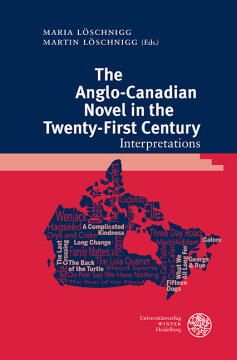
BUCH
The Anglo-Canadian Novel in the Twenty-First Century
Interpretations
Herausgeber: Löschnigg, Maria | Löschnigg, Martin
Anglistische Forschungen, Bd. 466
2019
Zusätzliche Informationen
Bibliografische Daten
Abstract
Addressing academic and general readers, this volume provides interpretations of major Canadian novels in English published during the last twenty years. Comprising a wide range of topics and genres, including writing by recent immigrants and by First Nations authors as well as speculative fiction on global future(s), these novels testify to the richness, vitality and diversity of contemporary Anglo-Canadian writing. The twenty-five essays by established and emerging scholars in the field show how contemporary Canadian novels in English have reflected transformations in Canadian society since the turn of the millennia. In particular, they reappraise the cultural diversity which is central to an understanding of contemporary Canadian writing. The volume thus investigates the ongoing formation of a specifically Canadian form of multiculturalism and of Canadian cultural sensibilities as acted out in literature.
Inhaltsverzeichnis
| Zwischenüberschrift | Seite | Aktion | Preis |
|---|---|---|---|
| Cover | Cover | ||
| Titel | 3 | ||
| Imprint | 4 | ||
| Contents | 5 | ||
| A Very Short Introduction | 9 | ||
| Rūta Šlapkauskaitė (Vilnius): An Arc of Itinerant Tropes: Beyond Kin and Kind in André Alexis’s „Fifteen Dogs“ (2015) | 11 | ||
| Coral Ann Howells (London): Dire Cartographies: Margaret Atwood’s „MaddAddam“ Trilogy (2003–2013) | 21 | ||
| Martin Kuester (Marburg) Shakespearean Godgames in Makeshiweg, Ont.: Margaret Atwood’s „Hag-Seed“ (2016) | 33 | ||
| Silvia Mergenthal (Konstanz): Indigeneity, Trauma and Healing: Joseph Boyden, „Three Day Road“ (2005) | 43 | ||
| Nassim Winnie Balestrini (Graz): Abused by Fish Bellies, Accompanied by Manitous: The Residential School System’s Death Toll in Joseph Boyden’s „Wenjack“ (2016) | 51 | ||
| Carmen Birkle (Marburg): Geographies, Ethnicities, and the Cultures of Belonging: Dionne Brand, „What We All Long For“ (2005) | 61 | ||
| David Creelman (Saint John, NB): Protest, Tragedy, and the Triumph of Language: George Elliott Clarke’s „George & Rue“ (2005) | 75 | ||
| Elisabeth Gießauf (Graz): The Mythopoeic Power of Fish Stink: Michael Crummey’s „Galore“ (2009) as an Ode to Story-Telling | 85 | ||
| Sherrill Grace (Vancouver): ‘Turning the page’: Timothy Findley’s „Pilgrim“ (1999) | 95 | ||
| Melanie Braunecker (Klagenfurt): Drilling for Oil with No Holds Barred: Don Gillmor’s „Long Change“ (2015) | 105 | ||
| Johannes Wally (Graz): Daniel Defoe, Michel Tournier and the Autonomous Subject: Douglas Glover’s „Elle“ (2003) | 113 | ||
| Sabrina Thom (Graz): “Tell me more! Tell me more!” Sensationalism and Trauma in Rawi Hage’s „Cockroach“ (2008) | 123 | ||
| Anna Branach-Kallas (Toruń): Ontologies of Disability/Ontologies of Care: Frances Itani’s Deseronto Trilogy (2003–2017) | 131 | ||
| Brigitte Johanna Glaser (Göttingen): Trauma, Memory, and Art: Frances Itani, „Requiem“ (2011) | 141 | ||
| Maria Löschnigg (Graz): Native Ecologies: Thomas King’s „The Back of the Turtle“ (2014) | 151 | ||
| Silke Jandl (Graz): Trauma, Liminality, and Narrative Voice: Tracey Lindberg’s „Birdie“ (2015) | 163 | ||
| Maximilian Feldner (Graz): Mystery and Memory: Emily St. John Mandel’s „The Lola Quartet“ (2012) | 173 | ||
| Martin Löschnigg (Graz): Is There Room for Happiness? Rohinton Mistry, „Family Matters“ (2002) | 181 | ||
| Dagmara Drewniak (Poznań): “The journey was to be an innocent story …”: Rites of Passage in Michael Ondaatje’s „The Cat’s Table“ (2011) | 193 | ||
| David Staines (Ottawa): Music in the Air: Madeleine Thien, „Do Not Say We Have Nothing“ (2016) | 209 | ||
| Jason Blake (Ljubljana): Strong Voices: Miriam Toews, „A Complicated Kindness“ (2004) | 217 | ||
| Marzena Sokołowska-Paryż (Warsaw): “The difficult architecture of a new world”: Jane Urquhart, „The Stone Carvers“ (2001) | 227 | ||
| Heinz Antor (Cologne): Centrepiece of the Western Trilogy: Guy Vanderhaeghe’s „The Last Crossing“ (2002) | 243 | ||
| Don Sparling (Brno): Making a Life: Richard B. Wright, „Clara Callan“ (2001) | 251 | ||
| Contributors | 261 | ||
| Backcover | 267 |


 Publishing Platform by CloudPublish
Publishing Platform by CloudPublish